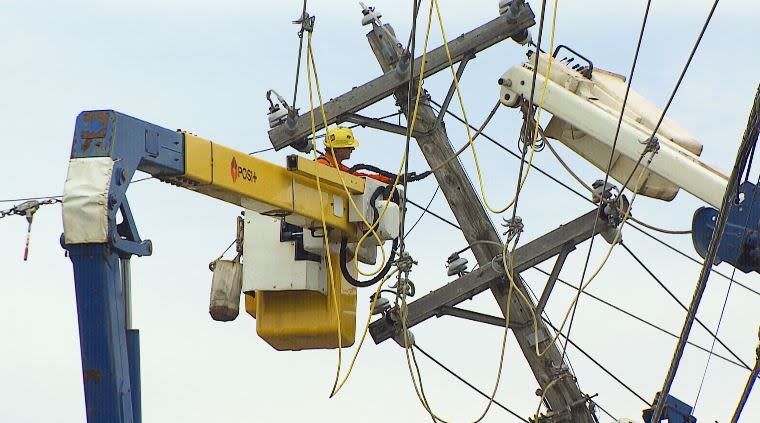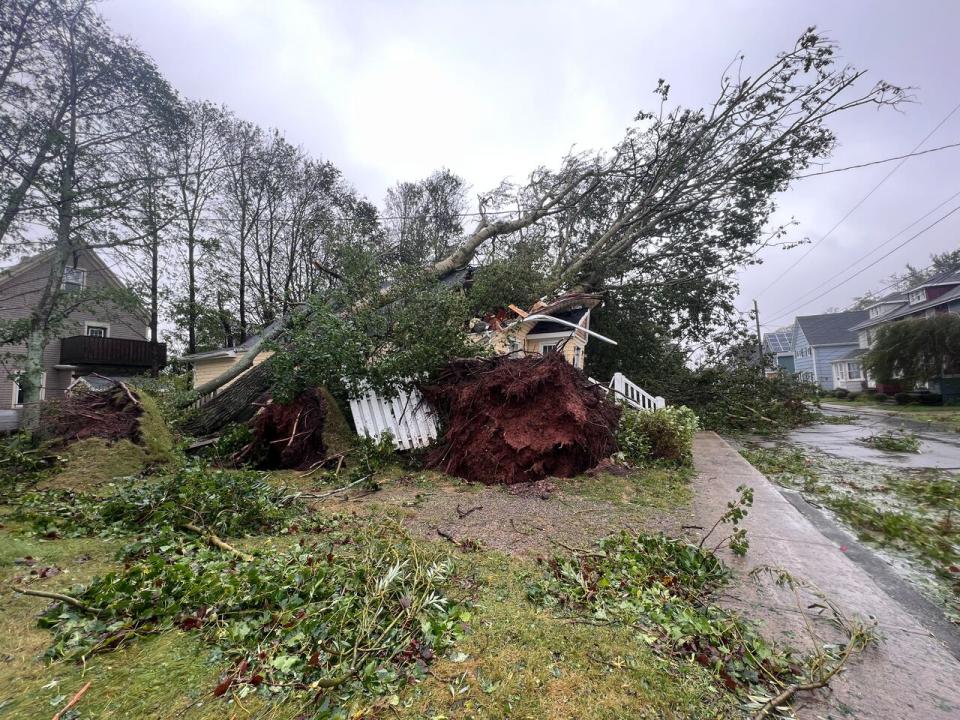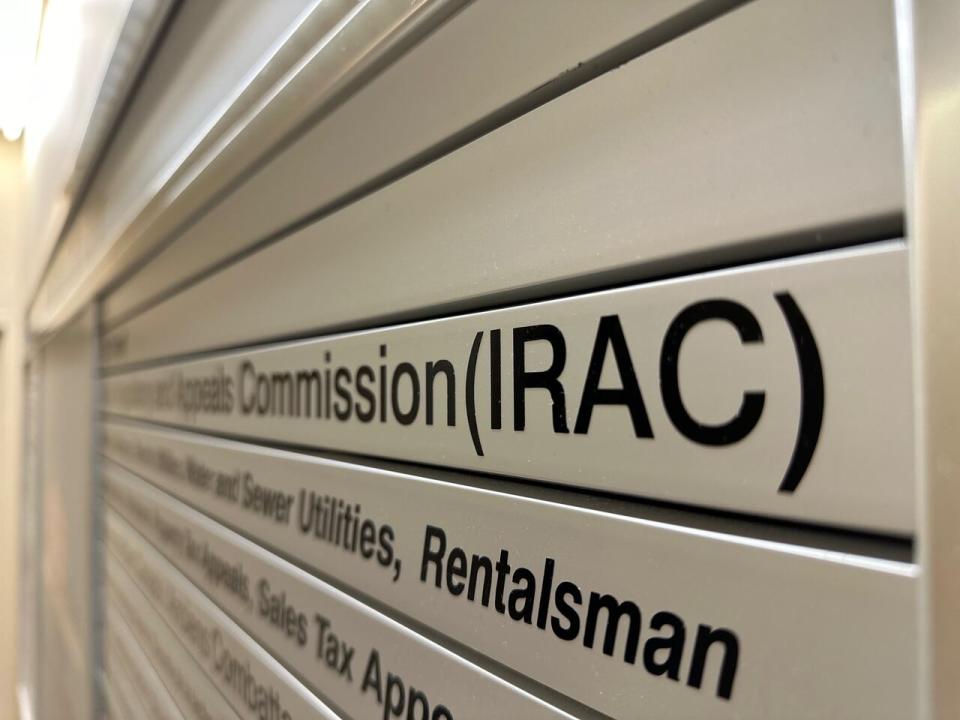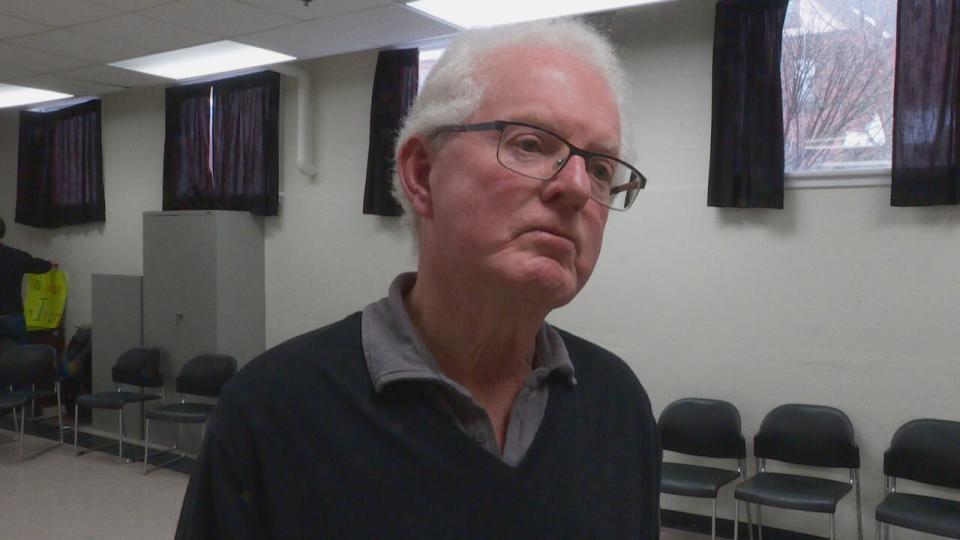Community group denied voice in conversation about P.E.I. electricity rate hikes

With just weeks to go before another proposed rate hike from Maritime Electric would kick in, the Island Regulatory and Appeals Commission has turned down an application from a group that wants to intervene on behalf of the public.
Maritime Electric is seeking to recoup $37 million in costs to restore electricity after post-tropical storm Fiona devastated the province's grid.
A co-operative called Energy Democracy Now! applied in December to be an intervener, stating in its application that "Island residents are facing another electricity rate increase, at a time when many simply cannot afford it."
Maritime Electric has proposed a 2.9 per cent increase in residential power rates to kick in March 1 to cover Fiona costs. That increase would be in place for five years.

Fiona left behind downed trees and damaged homes in Charlottetown on Sept. 24, 2022. (Mikee Mutuc/CBC)
The Island Regulatory and Appeals Commission has already approved another rate increase of 2.5 per cent to kick in the same day.
In total that would make an increase of 5.5 per cent over the rate set last October, and a 12 per cent increase compared with a year ago.
In its application for intervener status Energy Democracy Now! said it wants to "introduce a community voice at the table when proceedings on matters of public interest take place."
Specifically, the group said it wanted the chance "to illustrate [Maritime Electric's] lack of preparedness for severe weather events related to climate change," and to argue the company's shareholders should be required to cover some of the costs.
In its rebuttal to the application, Maritime Electric told IRAC there was "no evidence to establish that the applicant can 'meaningfully contribute' to this proceeding," and that the group had not identified any expertise in "assessing the costs of public utilities, in the allocation of costs to operating or capital accounts, or knowledge of the objective of balancing timely cost recovery versus rate shock."

Maritime Electric told IRAC that the group Energy Democracy Now! wouldn't ‘meaningfully contribute’ to the electric utility's hearing to increase rates. (Aaron Adetuyi/CBC)
IRAC agreed with Maritime Electric, writing in its response that "the issues of energy democracy, energy policy, public ownership of energy utilities, and the transition to renewable energy" – all stated principles of Energy Democracy Now! – "are not at issue in this particular proceeding."
Thus, IRAC said it was "not satisfied that the Co-op is engaged in the subject matter of the proceeding, or that their submissions will assist the Commission in resolving the issues at hand."
Leo Broderick is listed on the application form as the president of Energy Democracy Now! Broderick is known for his long association with a number of social justice causes and for his work with the Council of Canadians.

Leo Broderick, known for his long association with a number of social justice causes, is listed as the president of Energy Democracy Now! (Sarah MacMillan/CBC)
He declined a request for an interview, saying his group needed to meet to discuss the response it received from IRAC.
No advocate for Island consumers
While Nova Scotia and New Brunswick have designated advocates whose job it is to represent the public interests of consumers in rate hearings, P.E.I. has not.
There have been calls for P.E.I. to designate one.
In 2017 then-PC MLA Jamie Fox introduced a private members' bill to accomplish that, the Public Intervener Act.

Former PC MLA Jamie Fox introduced a private members’ bill called the Public Intervener Act in 2017 that would allow for designated advocates to represent public interests in rate hike hearings. (Shane Hennessey/CBC News)
"The Liberal government of the day killed it to protect IRAC and not Islanders," Fox said via text message to CBC this week on the fate of his bill.
Fox resigned from his provincial seat at the end of the last sitting of the legislature and has been nominated to run for the federal Conservative party in the next federal election.
Asked why the Progressive Conservative government he was part of hasn't moved forward with something similar, Fox said "I was pushing for it, my stance has never changed."
CBC reached out to the Department of Environment, Energy and Climate Action for comment, but received no information in time for publication.
Public hearing plans unclear
A spokesperson for IRAC said the Commission hasn't yet decided whether there will be a public hearing as part of Maritime Electric's rate application. None has so far been scheduled.
In its letter asking IRAC to deny intervener status for Energy Democracy Now!, Maritime Electric also argued no public hearing is required, that the documents the company has provided "confirm that Fiona-related costs were prudently incurred in accordance with good utility practice."
No other parties have applied for intervener status. The P.E.I. government has intervened in other applications, including when IRAC was considering a change in its rate structure that would have increased costs for farmers.
There was no information provided Friday when CBC asked if the province planned to intervene in this application.
Feds won't cover costs
Premier Dennis King had originally said the federal government would cover Maritime Electric's Fiona costs, but Ottawa later said the private utility is too large a corporation to access disaster relief funds intended for small businesses.
IRAC told Energy Democracy Now! it could provide written submissions and questions, just as members of the public can and have been doing.
Roger King was on the panel that reviewed P.E.I.'s energy grid more than a decade ago.
In his submission on the current rate application, King pointed to figures showing Maritime Electric would boost its profits by $4.4 million over five years from the return on investment it will earn on restoration costs.
He said it would reduce costs for customers if government was to take on at least part of the debt load, to take advantage of lower interest rates.
King and others who made submissions to IRAC have argued Maritime Electric and shareholders of its parent company Fortis should have to absorb at least some portion of Fiona costs.


